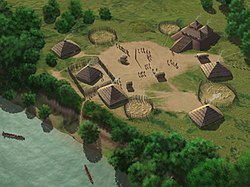Depends on what you mean by a city. According to Oxford, a city can be defined as a large town and according to Encyclopedia Britannica, a city is a "relatively permanent and highly organized centre of population, of greater size or importance than a town or village". Since what is consider a 'city' population can vary between regions and nations, it is hard to say what is considered to be the determining size for a city. Thanks to the laws in Croatia, the town of Hum with a population of 23 is considered a city - the smallest city in the world by population.
Now, if you want to isolate, you could have a city that tries something like the North Sentinelese, have a city on a remote island that is hostile to many people in the outside world. The North Sentinelese are a primitive group, but they live on an island with a population estimated to be between 80 to 150 people. This meets the population criteria of certain places, even if it doesn't meet the technology requirement. Now, the North Sentinelese are able to survive on the island meaning they are self-sustaining, able to live on just what the island provides. Being self-sustaining is important for your city being isolated - it will have to be able to survive with little to no assistance from the outside world. So is the isolation of being on an island, with the amount of water between the city and another human settlement being a great reason for people to stay and no one to get in or out.
Now, while they can have technology, it would be hard for them to have modern technology if they are truly, completely isolated from everyone else. Even North Korea depends on handouts from China to get the technology it has. Without modern technology, the 'city' in question could be built by more primitive means similar to the Mound Cultures in North America.

Using sculpted rocks and soil to make earthworks, platform mounds in the form of small 4-sided truncated pyramids, homes, and buildings could be created with primitive tools or with whatever modern hardware tools they can get their hands on. With this, you could form a small city isolated from the rest of the world. You can have the city be simply far away enough that most people would rarely want to visit it or make the people so distrustful of the outside world that they will use weapons to attack those they don't like and/or potentially capture anyone who arrives to the island city, forcing them to remain a resident of the city. In my opinion, the later would make it easier for the city to remain isolation since the people would simply be too dangerous for anyone who wasn't insane to want to go to. This will probably make the inhabitants xenophobic or distrustful of outsiders. The only outsiders that might be trusted might be those who are captured and indoctrinated.

